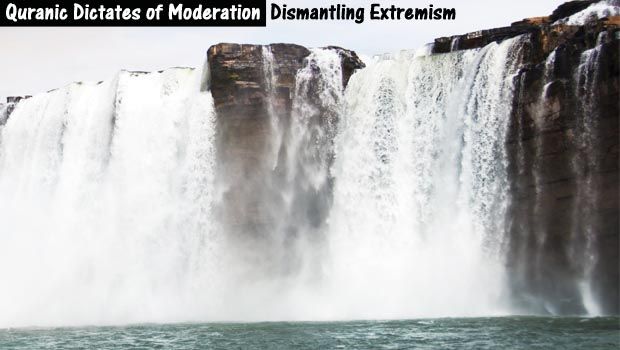A previous article on this subject stated: “Those who founded and direct ISIS, and all those who follow their ideology and participate in their terror campaign, must ignore all the verses (mentioned in the previous article such as 2:190, 8:61, 2:193, 42:40-42, 42:43, 47:4, 6:151, 2:256, 3:20) and the many more that are spread throughout the Quran (that contradict their ideology). They have to ignore the divine injunctions that warn against aggression, or refusing to accept overtures of peace, about not allowing persecution to ultimately turn the persecuted into a persecutor. They spurn the Quranic ordinance that all people have the right to due process, that life may be taken only within the parameters of justice and law, that Islam must not be forced upon any individual in that only by voluntary choice does it have any meaning and value for that person. Extremists also have to ignore all the Prophet’s warnings about not harming non-combatants, restraining from treachery, destruction of vegetation or animals, or places of human habitation. And then there is a clincher: ‘And if your Lord had pleased, surely all those who are on the earth would have believed — all of them; will you then force men till they become believers?’ (10:99).”
Didier Francois spent more than ten months as an ISIS prisoner in Syria. He said, “There was never really discussion about texts… it was not a religious discussion. It was a political discussion.” He continued, “It was more hammering what they were believing than teaching us about the Quran. Because it has nothing to do with the Quran.” He added, “…they didn’t want even to give us a Quran.”
In fact, the proponents of the concept of permanent war against the non-Muslim world, and its embrace of aggressive and invasive military jihad, use verses in Surat al-Tawba to bolster their claims. It is worthwhile to quote Shaykh Rashid Al-Ghannoushi in this regard: “The Qur’anic texts used [by extremists] call for fighting against all polytheists, such as verse 36 of surat al-Tawba (And wage war on all of the idolaters as they are waging war on all of you.) (At-Tawbah 9:36), (…slay the idolaters wherever ye find the) (At-Tawbah 9:5), and (Fight against such of those who have been given the Scripture as believe not in Allah nor the Last Day … until they pay the tribute readily, being brought low) (At-Tawbah 9:29).” He notes that these verses are used by the proponents of permanent war, in effect, to supersede and override more than “200 such verses calling for mercy, forgiveness and freedom of belief, prohibiting compulsion in faith and severity, and considering the judgment of people’s faith a matter to be left to God alone.”
Al-Ghannoushi goes on to say, “That Qur’anic verses, particularly those of surat al-Tawba commanding fighting against all polytheists, are to be understood as a reaction and an equal retribution, just as the verse says ‘as they fight you all together,’ and not a general command or a basis for dealing with all non-Muslims, but was rather concerning a specific group of the Arab polytheists which declared war on Islam since its emergence, chased it out and followed it to its new home, broke treaties and mobilized everyone to eradicate it (Will ye not fight a folk who broke their solemn pledges, and purposed to drive out the messenger and did attack you first?) (At-Tawbah, 9:13). Within the same chapter, as well as in other chapters, there are limits and conditions restricting the above –seemingly general — command: (And if they incline to peace, incline thou also to it) (Al-Anfal, 8:61). There is no need to set one verse of the Qur’an against another; rather one should look at all relevant verses and hadith, all of which confirm the rule that Islam seeks peace with those who are peaceful towards it, and fights those who fight it.”
Their Behavior Tells the Tale
Extremist leaders and propagandists take God’s verses out of context and obscure other texts that contradict their agenda. They claim the right to act towards those they consider unbelievers, infidels, or even Muslims who don’t embrace their extremist ideology and military campaign, in ways that any decent human being would see as clearly immoral and repulsive. While fomenting merciless conflict, sectarianism, and disunity, they proclaim themselves as sole representatives and proponents of God’s will, arrogantly claiming for themselves a special, chosen status before God. As to those who join in the rank and file of ISIS, they follow whatever their leaders command them without thinking for themselves and using their faculties of reason, common sense, and moral conscience.
Reports from mainstream media profile a small number of defectors from ISIS who are speaking out. In a NYT article in September of last year, “ISIS Defectors Reveal Disillusionment,” former ISIS fighters lamented ISIS’ “hostility to other Sunni rebel groups,” the “indiscriminate killings of civilians and hostages,” and their own experience of “mistreatment by commanders.” Some of them also stated that they came to realize that life as an ISIS fighter “was far less exciting, or lucrative, than they had imagined.” Syrian citizens who have escaped from ISIS-held territory describe how ISIS enters a town promising justice and security, but gradually become more authoritarian and harsh, arrogantly doling out their restrictions and punishments while the ISIS fighters live a privileged life.
One might wonder how many individuals join ISIS for monetary gain or fantastical glory, with any Islamic ideal as more cultural identity and political fantasy than religious conviction. In fact, as reported by CNN, there is indication that religion is not the priority for many of the fighters. Didier Francois spent more than ten months as an ISIS prisoner in Syria. He said, “There was never really discussion about texts… it was not a religious discussion. It was a political discussion.” He continued, “It was more hammering what they were believing than teaching us about the Quran. Because it has nothing to do with the Quran.” He added, “…they didn’t want even to give us a Quran.” There are also reports of amphetamines such as Captagon being distributed to fighters to induce euphoria and feelings of indestructability. One fighter told a CNN reporter, “They gave us drugs, hallucinogenic pills that would make you go to battle not caring if you live or die.”
Enter the Gate in a Posture of Humility
There is a verse in the Quran speaking about the Children of Israel: “And remember it was said to them. ‘Dwell in this town and eat therein as you wish, but say the word of humility and enter the gate in a posture of humility. We shall forgive you your faults; We shall increase [the portion of] those who do good” (7:161). The phrase “enter the gate in a posture of humility” uses, in the Arabic text, the word “hittatun,” translated as “humility.” In his commentary, Abul ala Maududi states, “They were told not to enter the town like cruel and ruthless tyrants, but to go in meekly and with humility like God-fearing people, just as Muhammad pbuh did at the conquest of Makkah. ‘Hittatun’ implies two things: you should enter the town (1) begging Allah’s forgiveness for sins, and (2) granting general amnesty and abstaining from plundering and murdering the inhabitants.” These are the attributes of Islamic magnanimity, of being high-minded and utterly committed to observing all the fundamental principles which govern conflict or warfare.
Yet, when ISIS fighters take over new territory, they ride into town in their convoys of Toyota trucks with AK-47s held aloft. A reputation of terrifying brutality precedes them. Not only do the extremist groups behave in ways that are contrary to Quranic injunction and Prophetic wisdom and example, they also betray the cherished Islamic ideals of moderation, virtue, compassion, tolerance and pluralism, forbearance, and uncompromising commitment to justice:
Moderation — “We made you to be a community of the middle way, so that you might bear witness to the truth before all mankind” (Qur’an, 2:143).
Virtue — “Let there arise from among you a band of people who invite to righteousness, and enjoin good and forbid evil” (Qur’an, 3:104).
Compassion — Prophet Muhammad, said: “All creation is the family of God, and the person most beloved by God [is the one] who is kind and caring toward His family” (Agreed upon).
Religious and cultural tolerance and pluralism — “He who wrongs a Jew or a Christian will have myself as his accuser on the Day of Judgment” (Bukhari).
Forbearance — When asked by someone to curse the unbelievers, the Prophet said, “I was not sent to call down curses on people, but as a mercy” (Muslim, Al-Bayhaqi, and Tabarani).
Uncompromising commitment to justice — “…Let not the hatred of others to you make you swerve to wrong and depart from justice. Be just; that is next to piety. And fear Allah. For Allah is well-acquainted with what you do” (Quran 5:8).
Do ISIS members genuinely believe they represent these Islamic ideals?
Entering the Lizard Hole
A multitude of verses in the Quran criticize the people of the book, the Jews and Christians, as communities which were sent prophets and scripture but who over time deviated from the teachings. Many Muslims think that those verses are meant simply to expose the former communities of faith for their infidelities to God. Are those verses, however, not also a cautionary tale for Muslims so that they avoid falling into similar errors? In fact, the Prophet (pbuh) said, “You will indeed follow the ways of those before you, hand span by hand span, and an arm’s length after another. Even if they enter into a lizard’s hole, you will follow them.’ We [the companions] asked, ‘Is it the Jews and the Christians?’ He replied, ‘Who else’” (Bukhari). Some Muslim commentators understand this hadith to mean that Muslims are being warned not to imitate non-Muslims in their mode of dress, or in observing certain holidays or other Western traditions. Is there not, however, much more serious implication to this hadith?
What does the lizard hole signify? A lizard crawls on its belly, lying flat on the earth, a cold-blooded creature that has nothing but instinct by which to survive – no reason, no common sense, no latitude of free will by which to choose its course of existence. In contrast is the human being who stands upright. The Quran says, “So set your face to al-deen al-haneef – the nature in which God has made humankind… (Quran 30:30). Al-deen al-haneef can be translated as the religion or the way of life which is aligned with reality and truth and, therefore, morally and spiritually upright. Upright means an erect or vertical posture (in contrast to the lizard) as well as virtuous, honest, and just. That which is haneef strives to be well-balanced in judgment and resolute in faith. Entering into the lizard hole is failing to live up to the imperatives of eman, refusing to live in an upright way, shirking human responsibility with regard to the dictates of morality and justice.
Moderation, Not Extremism
An interesting study is to look at an array of verses in the Quran that describe how former communities of faith were cautioned about human vulnerability and the dangers that they faced, and how they fell into error. We find many relevant verses, among which are the following:
- They were warned not to commit excess in their religion and not to utter lies about God — 4:171
- They were warned not to follow vain desires of people who went wrong in times gone by, those who misled many, and strayed from the even way — 5:77
- They believed in spurious ideas, conjectures, and fictions — 4:51
- They broke up their unity out of jealousy — 42:14
- They took their learned ones and religious leaders as lords besides God — 9:31
- They hid things or made obscure things that were in their scripture — 5:15
- They threw away their Book behind their backs — 2:101
- They took revealed verses out of context — 4:46
- They attributed their lying inventions to God — 4:50
- They considered themselves pure spiritually, claiming for themselves special sanctity, with no cause to do so — 4:49
- They believed they had a share in God’s dominion — 4:53
- They were smug, believing that they are uniquely God’s beloved ones — 5:18
- They claimed that God does not command them to act morally and justly toward those outside their religious community — 3:75
If we go back and read the section on extremist ideology and behavior, we find that they clearly do not “enter the gate in a posture of humility.” They are more akin to lizards, cold-blooded, creeping along the face of the earth without mercy or common sense. The Quranic warnings apply to all. Human beings are prone to sliding down the slippery slope and ISIS members have plunged headlong into the ruinous errors listed above: excess and barbarity; following ego desires for power and glory; taking God’s verses out of context and obscuring other text; claiming the right to act in clearly immoral ways towards those they consider unbelievers or subpar Muslims; fomenting sectarianism and disunity among Muslims; proclaiming themselves as sole representatives and proponents of God’s will; arrogantly claiming for themselves a special, chosen status before God; and, regarding the rank and file, following whatever their leaders command them without thinking for themselves and using the faculties of reason, common sense, and moral conscience.
The previous article on this topic concluded: “One cannot read the many verses and hadeeth (pertaining to the Islamic dictates of ethics and justice) and come away with anything but conviction that Islam is, indeed, a religion of moderation, not one of extremism, and that is seeks to bring succor to the world, not terror; that peace is the objective, not conflict or war, and that freedom of conscience is to be safeguarded rather than corralled or obliterated.”
“And say: ‘The truth is from your Lord.’ Then whosoever wills, let him believe, and whosoever wills, let him disbelieve” (Quran 18:29).






